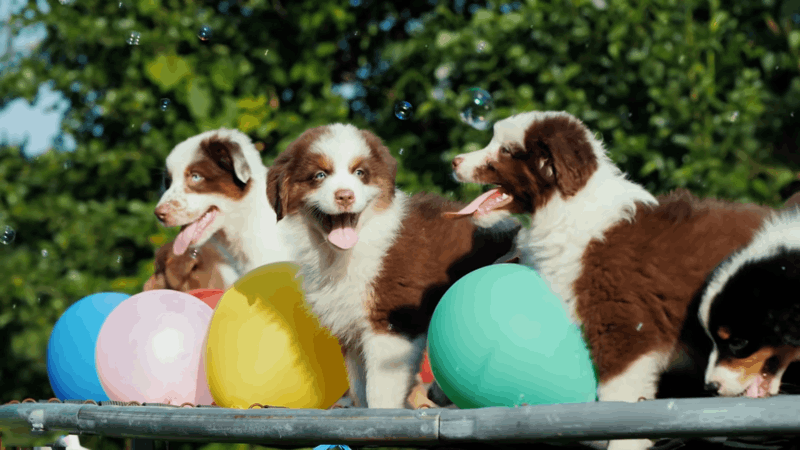No products in the cart.
For pet owners, unexplained weight loss in dogs can be a concerning issue, prompting a natural inclination to seek effective solutions for helping our furry companions regain a healthy weight. In this blog, we will explore the topic of weight loss in dogs and the potential role of dog CBD, its benefits, considerations, and other traditional methods to help dogs achieve a better health.
Understanding Weight Loss in Dogs

Weight loss in dogs is a common concern among pet owners and can indicate underlying health issues. An imbalance between the calories consumed and the calories burned is the reason why weight loss in dogs occurs. A lack of proper diet, underlying medical issues, or an extreme increase in physical activity can all contribute to this.
Monitoring a dog’s weight and ensuring they receive a balanced diet and regular exercise is crucial in preventing unwanted weight loss. To determine the underlying cause of weight loss and develop an appropriate treatment plan to help the dog regain a healthy weight, please consult a veterinarian as soon as possible.
Signs of Weight Loss in Dogs
Signs of weight loss in dogs can include:
- Visible rib cage and backbone: If you can easily see and feel your dog’s rib cage and backbone without applying pressure, it may indicate weight loss.
- Decreased body condition: Dogs with weight loss may appear thinner, with a noticeable loss of muscle mass and a lack of overall body condition.
- Loss of appetite: A sudden decrease in appetite in dogs or reduced interest in food can lead to weight loss in dogs.
- Increased prominence of hip bones: The hip bones becoming more pronounced or visible is a sign of weight loss.
- Reduced energy levels: Dogs that have lost weight may display decreased energy levels, appear lethargic, or have a decreased interest in physical activities.
- Changes in coat condition: Weight loss can affect a dog’s coat, resulting in a dull, dry, or flaky appearance.
- Changes in behavior: Dogs experiencing weight loss may exhibit changes in behavior, including irritability, restlessness, or increased anxiety.
- Vomiting or diarrhea: Persistent vomiting or diarrhea can lead to weight loss if the dog is not absorbing nutrients properly.
If you think your dogs have any sign of weight loss in dogs, please consult a vet because weight loss can be a symptom of various underlying health issues.
Weight Loss in Dogs Causes
If your dog is losing weight for no apparent reason, it is essential to investigate the situation further and consider several factors. Please consider these causes
- Inadequate nutrition: Feeding a poor-quality or insufficient diet can lead to weight loss in dogs. This may occur if the dog is not receiving enough calories, essential nutrients, or if the diet is not balanced.
- Medical conditions: Various medical conditions can cause weight loss in dogs. These may include dental problems, cancer, kidney disease, liver disease, diabetes, or infections,…
- Malabsorption issues: Conditions that affect the dog’s ability to properly absorb nutrients from the digestive system can lead to weight loss. Examples include inflammatory bowel disease, pancreatitis, or exocrine pancreatic insufficiency.
- Metabolic disorders: Certain metabolic disorders like hyperthyroidism or Addison’s disease, can disrupt the dog’s metabolism and result in weight loss.
- Aging: When dogs get older, their appetite decreases or they have difficulty digesting food so they may experience weight loss as a natural part of the aging process.
- Stress or anxiety: Dogs experiencing anxiety, chronic stress or emotional upheaval may have a reduced appetite and subsequent weight loss.
- Dental issues: Painful or deteriorating teeth can make it difficult for dogs to eat, leading to weight loss.
- Increased energy expenditure: Dogs engaging in excessive physical activity, such as working dogs or those participating in rigorous training, may burn more calories than they consume, resulting in weight loss.
If you think your furry friend is experiencing unexplained weight loss, please consult an animal specialist. The vet can conduct a thorough examination, run diagnostic tests, and determine the underlying cause to provide appropriate treatment and care for your furry friend.
How Heavy Should My Dog Be?

You can generally refer to breed standards and body condition scoring to get an idea of a healthy weight range for your dog.
- Breed standards: Different dog breeds have varying size and weight standards. Breed organizations and kennel clubs often provide guidelines or specific weight ranges for each breed.
- Body condition scoring: Evaluating your dog’s body condition can help determine if they are at a healthy weight. Body condition scoring systems typically use a numerical scale or descriptive terms to assess factors such as rib visibility, waistline definition, and overall muscle mass.
- Health and age considerations: Health conditions, such as arthritis or specific medical needs, may affect your dog’s optimal weight. Older dogs may naturally carry slightly more weight to support joint health.
- Individual variations: Just like humans, dogs can have different body types and variations within a breed. Some dogs may naturally be leaner or heavier than others within the same breed. Instead of trying to reach a certain weight on the scale, it’s crucial to concentrate on your dog’s overall health and physical condition.
Consulting with your veterinarian is crucial in determining the appropriate weight range for your dog. They can provide guidance based on your dog’s specific characteristics and health status. Regular monitoring and adjustments to diet and exercise can help maintain your dog at a healthy weight throughout their life.
Home Remedies to Get My Dog to Gain Weight

For an accurate diagnosis and appropriate treatment plan for your dog’s weight loss, there are some home remedies you can try to help your dog gain weight in addition to consulting with a veterinarian.
- Nutritious and high-calorie diet: Well-balanced and high-quality dog food are so important and please make sure that they are appropriate for the age and health condition of your beloved canine companions.
- Frequent and controlled feedings: Offer smaller, more frequent meals throughout the day rather than a large meal all at once. This may aid in increasing their appetite and make it simpler for them to eat more calories.
- Food toppers and supplements: Consider adding healthy and calorie-dense food toppers to your dog’s meals, such as cooked lean meats (e.g., chicken, beef), cottage cheese, plain yogurt, or canned pumpkin. Using dietary supplements to aid in weight increase, such as omega-3 fatty acids or particular weight-gain supplements, is another topic you can address with your veterinarian.
- Treats and snacks: Include wholesome, calorie-dense treats and snacks in your dog’s diet. Offer small, frequent treats throughout the day to encourage them to eat more.
- Meal enhancement: Enhance the aroma and palatability of your dog’s food by lightly warming it or adding low-sodium chicken or beef broth. This can make the food more enticing and appealing to your dog.
- Regular exercise: Engage your dog in regular, moderate exercise to stimulate their appetite and promote muscle development. Discuss the best exercise regimens with your vet based on the health and condition of your dog.
To ensure the underlying cause of your dog’s weight and to determine the most suitable approach for helping your dog gain weight safely and healthily, working closely with your vet is so important. They can provide specific guidance tailored to your dog’s needs and monitor their progress along the way.
Common Mistakes to Avoid When Managing Weight Loss in Dogs
Here are some common mistakes pet owners should avoid when help dogs gain weight
- Crash dieting: Rapidly reducing a dog’s food intake or putting them on an extremely low-calorie diet can be harmful and may lead to nutritional deficiencies. Gradual and controlled weight loss in dogs is safer and healthier.
- Inconsistent feeding: Inconsistency in feeding times or portion sizes can disrupt a dog’s routine and make it difficult to monitor their calorie intake. Establish a regular feeding schedule and measure portions accurately.
- Overfeeding treats: Treats are an important part of dog training and rewarding, but excessive treat consumption can contribute to weight gain. Monitor the number and calorie content of treats given to your dog and incorporate them into their overall daily calorie allowance.
- Lack of exercise: Relying solely on a restricted diet without incorporating regular exercise can hinder weight loss progress. Regular physical activity helps burn calories, build muscle, and improve overall fitness. Determine the best exercise regimen for your dog’s age, breed, and health by speaking with your vet.
- Ignoring medical conditions: Unexplained weight loss in dogs may be a symptom of an underlying medical condition. It’s important to address and treat any medical conditions contributing to weight loss to effectively manage their weight. Consult with a veterinarian for a proper diagnosis.
- Inaccurate portion control: Accurate portion control is crucial for weight management. Measuring food using a kitchen scale or specific measuring cups can help ensure proper portion sizes and prevent overfeeding.
- Lack of regular weigh-ins: Regularly monitoring your dog’s weight progress is essential for successful weight management. Keep track of their weight and body condition score to gauge their progress and make necessary adjustments to their diet and exercise regimen.
- Disregarding professional guidance: Consulting with a veterinarian or a veterinary nutritionist is highly recommended when managing weight loss in dogs. They can provide valuable guidance, create a tailored weight management plan, and monitor your dog’s progress.
By avoiding these common mistakes, you can ensure a safe and effective approach to managing weight loss in dogs and help them achieve a healthier weight.
How Long Does It Take for a Dog to Gain Weight?
Depending on the degree of the weight loss in dogs and the underlying causes, it may take a dog a few weeks, several months, or even longer to put on weight. It’s crucial to keep a close eye on the dog’s development, frequently evaluate their physical health, and alter their nutrition, exercise routine, and treatment plan as appropriate under the direction of a veterinarian.
A safe weight gain rate for dogs is typically between 1 and 2 percent of their body weight per week. This equates to roughly 0.5-1 kilogram (1-2 pounds) per month for an average-sized dog. However, individual dogs may have different needs and may respond differently to weight gain efforts.
To ensure that weight growth is accomplished safely and successfully, it is essential to collaborate closely with your veterinarian throughout the procedure. They can provide personalized guidance, monitor the dog’s health, and make any necessary adjustments to the treatment plan to support the dog’s weight gain journey.
CBD for Weight Loss: Does it Work in Dogs?

Further study and empirical support are needed for the use of CBD for weight loss in dogs. More research is required to assess the possible advantages, dangers, and ideal dosage of CBD for canine weight loss.
It’s essential to focus on proven methods for managing weight loss in dogs, such as proper nutrition, portion control, regular exercise, and addressing any underlying medical conditions. These approaches, combined with professional veterinary guidance, can help promote healthy weight management in dogs.
Consult a veterinarian who is experienced with CBD use in animals if you’re thinking about using CBD to help your dog lose weight. They can provide guidance based on your dog’s specific health condition, assess potential interactions with other medications, and recommend appropriate products from reputable sources.
Conclusion
Weight loss in dogs is a serious health issue that pet owners should consider carefully if they want to protect their furry friends from common diseases. It can be indicative of underlying health issues or inadequate nutrition. Identifying the signs of weight loss and understanding its potential causes is crucial for effective management. You can guarantee your dog’s general health and quality of life by giving their welfare top priority and implementing preventative measures.
Hello, I am Hazel Bennett, an experienced copywriter specializing in the fascinating topic of CBD for dogs. With a passion for pet wellness and extensive knowledge of CBD’s potential benefits, I am here to provide you with informative and engaging content.



